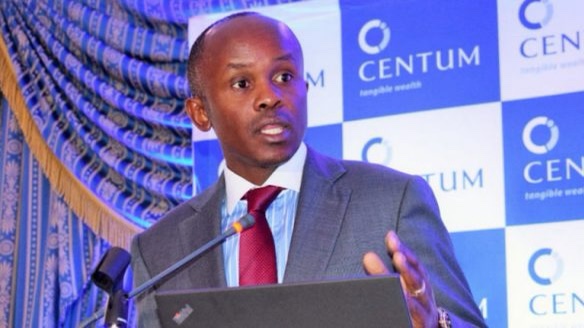Centum was founded in 1979 by the government as an investment arm of the Industrial Commercial Development Corporation (ICDC). ICDC had a mandate to spur foreign investments in the country and deepen industrialisation. (ICDC has now been merged with IDB Capital Tourism Finance Corporation to form Kenya Development Corporation, KDC). For a long time, the Centum ticker at the Nairobi Stock Exchange was ICDCI (Denoting ICDC Investment). ICDCI was established by the government as a means of allowing the common mwananchi, the famous Wanjiku, access to what would be otherwise inaccessible investments in the country. The likes of General Motors, Nairobi Bottlers and KWAL (No common Mwananchi could have the funding and access to invest directly into these assets but through ICDCI). It was renamed to Centum in 2008 with the advent of a new strategy famously known as Centum 2.0 initiated by James Mworia, a young, brilliant, and charismatic investment analyst, when he was hired as the CEO.
Centum has slightly over 38,000 shareholders and is controlled by the Late Chris Kirubi’s family who own 31% with the government, through KDC, being the second biggest shareholder with 23% shareholding. It is key to note that Centum is partly owned by the people of Kenya through the government. Also of note is that management and staff own less than 1% of the business pointing to a clear misalignment on share price performance. The Kirubi family is said to have more say and control over management, the board and strategy with the government content to have a board seat through KDC nominated directors.
Centum started out as a Private Equity firm with small ownerships in land and buildings but has morphed into a real estate company. It currently holds more than 75% of its KES 48 billion assets in real estate as compared to zero in 2009 at the beginning of its strategy.
Performance at the NSE; When in trouble, shift the blame.
Centum is quick to take credit of good returns and blame the market, media, twitter, shareholders and even the stock market, when it underperforms the market.
Centum is one of the dismally performing assets on the NSE. It is impossible to ignore the poor performance of the company at the Bourse. Over the last ten years, Centum has returned an annualised return of 1% (Capital Gains and Dividends). Since the CEO took over in January 2008, Centum has lost almost 50% of its market value. A shareholder would have been better off buying government bonds at 11% annual returns than investing in Centum even before factoring in the risk related to private equity and real estate investing and the underlying cost of management.
An article published on the 17th of May 2022 by Kenya Insights, a blog page titled ““Centum Investment: Corporate Greed That Has Left 37,000 Shareholders At The Risk Of Losing Their Investments” aptly captured the greed that has driven the management to ignore the shareholders and focus on their bonuses. It is unfortunate that for the first time, a Kenyan journalist had made the effort to critically analyse Centum using facts and figures, and had the courage to publish the article, only to pull it down three days later complete with an apology and retraction. The apology claimed “We have since established that the story was based on erroneous information. The misleading and malicious article was provided by former members of staff.” Fortunately, the story had pointed anyone who cared to listen in the right direction, the financial statements, and public disclosures.
While unfortunate that the article is not available, the financial statements are public documents. The article raised the following issues.
1. Centum has paid out significant bonuses over the last ten years (3.7 Billion) compared to a 3.8 Billion in dividends over the same period with a significant portion of that pay out (More than 40%) to the CEO.
2. Centum has gone on a debt binging exercise increasing its “Investment” debt to 25 billion (or more than 60% of its assets).
3. The Unrealised gains on Centum books is more than KES 20 billion or 75% of the investment assets. A significant increase from 45% ten years ago which may lay credence to the claims that Centum has been exaggerating its assets valuations to rump up profits thus earn higher bonuses and increase the asset value to access more debt.
In summary, the article did a splendid analysis on the above items. It is unfortunate that the second and third part that had been promised were not published and can only be speculated upon.
There's no story that cannot be told. We cover the stories that others don't want to be told, we bring you all the news you need. If you have tips, exposes or any story you need to be told bluntly and all queries write to us [email protected] also find us on Telegram

